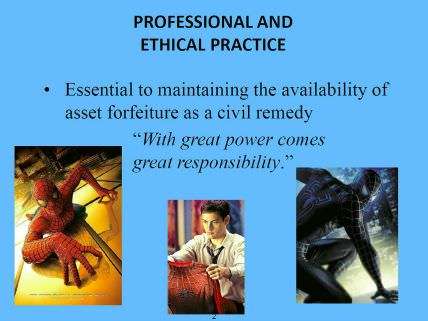Self-Funding Cops and Prosecutors, a.k.a. Armed Robbers
An ACLU lawsuit highlights the corrupting effect of civil forfeiture.

According to the Arizona Prosecuting Attorneys Advisory Council (APAAC), "an asset forfeiture practice that supplements other law enforcement activities provides an opportunity that is unique among governmental agencies—the direct augmentation of the agency's budget through the performance of its designated function." It's understandable that cops and prosecutors would be excited about this opportunity to beef up their budgets by taking people's stuff. But as the ACLU of Arizona emphasizes in the lawsuit it filed last week on behalf of a woman whose pickup truck was swiped by the Pinal County Sheriff's Department, giving law enforcement agencies a direct financial stake in forfeitures creates perverse incentives that undermine performance of their designated functions by encouraging them to target people based on their seizable assets rather than the threat they pose.
APAAC itself acknowledges the corrupting potential of civil forfeiture in a training slide titled "Don't Ruin Forfeiture for All of Us" that copies the form of ads for DirecTV:
• When your bosses can't find any money in their budget they get depressed.
• When they get depressed they tell you to start doing forfeiture cases.
• When you start doing forfeiture cases you go to a Forfeitures seminar.
• When you go to a Forfeitures seminar you feel like a winner.
• When you feel like a winner you go back to your jurisdiction and just start seizing everything in sight.
• When you just start seizing everything in sight you screw things up and lose everything.
• When you screw things up and lose everything you ruin forfeitures for all of us.
• Don't ruin forfeitures for all of us. Get the purpose of this seminar and follow an educated, ethical and professional forfeiture practice.
It's not completely clear what counts as screwing things up in APAAC's book. The examples it cites include a police chief and five officers in Romulus, Michigan, who "allegedly spent more than $100,000 in forfeited drug money to buy booze, marijuana, prostitutes, lavish trips and a tanning salon for the ex-chief's wife." I assume APAAC also would frown on using forfeiture money to pay off student loans or living rent free in a seized house for five years while using public money to cover the utilities, as two Oklahoma prosecutors recently were caught doing. But what about the home security system that Pinal County Attorney Lando Voyles (the lead defendant in the ACLU suit) bought with forfeiture money, or his forfeiture-funded donations to local sports leagues and other community organizations, which may attract favorable publicity and generate good will but have little to do with the designated function of the county prosecutor's office?
The use of forfeiture money for purposes more directly related to law enforcement is troubling too, especially given how dependent agencies have become on seizures to pay for personnel costs and equipment. "When the economy tanked and we lost a good part of our budget," Chris Radtke, chief of the administrative bureau at the Pima County Sheriff's Department, told a Tucson TV station in 2013, "we could absolutely not survive without [forfeiture money]." In response to a 2013 APAAC inquiry, Cochise County Attorney Ed Rheinheimer reported: "All of my [forfeiture] funds are used to supplement the salaries of my employees and office operating expenses. This use of my [forfeiture] funds has become necessary to avoid furloughs and/or layoffs as the county has cut back on staffing due to budget cuts." The ACLU, which collected those quotes, also notes that the Arizona Department of Public Safety's bomb squad, SWAT team, and hazardous materials unit seem to be entirely dependent on forfeiture funds.
The problem here is twofold. To the extent that law enforcement agencies fund themselves, they are less accountable to legislators and other overseers. And to the extent that forfeiture money pays for legitimate and necessary law enforcement expenses, agencies are always looking for assets to seize. In fact, taking them at their word, their very existence may depend on legalized theft.




Show Comments (32)